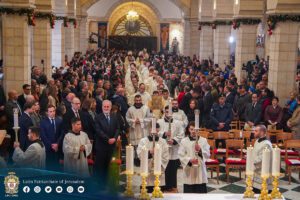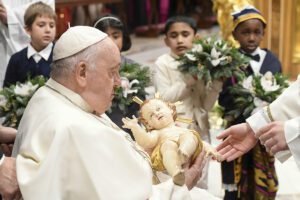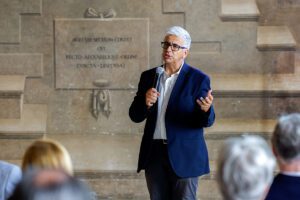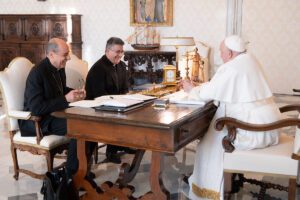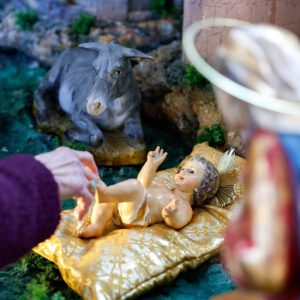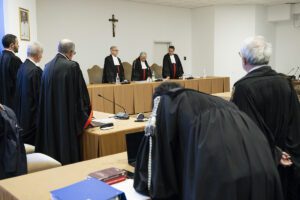VATICAN CITY (CNS) – Celebrating the birth of Jesus, the prince of peace, should mean making a commitment to opposing all war, to cherishing human life, feeding the hungry and speaking up for those who have no voice, Pope Francis said.
“To say ‘yes’ to the Prince of Peace, then, means saying ‘no’ to war — and doing so with courage — saying no to every war, to the very mindset of war, an aimless voyage, a defeat without victors, an inexcusable folly,” the pope said Dec. 25 as he read his Christmas message and offered his blessing “urbi et orbi” (to the city and the world).
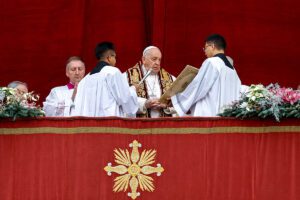
As he stood on the central balcony of St. Peter’s Basilica with an estimated 70,000 people gathered in St. Peter’s Square, the pope began his message speaking of Bethlehem where celebrations of Jesus’ birth are muted this year because of the Israeli-Hamas conflict.
But he also used his message to preach the hope of Christmas, which he said was found in God, who loved humanity so much that he sent his son to be born in a manger.
In the midst of darkness for whole nations or for individuals, he said, God sends his light.
“Let us exult in this gift of grace,” Pope Francis said. “Rejoice, you who have abandoned all hope, for God offers you his outstretched hand; he does not point a finger at you, but offers you his little baby hand, in order to set you free from your fears, to relieve you of your burdens and to show you that, in his eyes, you are more valuable than anything else.”
U.S. Cardinal James M. Harvey, archpriest of Rome’s Basilica of St. Paul Outside the Walls, stood alongside Pope Francis on the balcony, announcing a plenary indulgence available for everyone present, listening by radio, watching on television or following with “other means of communication.”
In his message, Pope Francis said Christmas is a call to push for peace and to educate oneself about the arms industry, which foments killing.
“People, who desire not weapons but bread, who struggle to make ends meet and desire only peace, have no idea how many public funds are being spent on arms,” he said. “Yet that is something they ought to know! It should be talked about and written about, so as to bring to light the interests and the profits that move the puppet-strings of war.”
War “is devasting the lives” of Israelis and Palestinians, he said.
“I embrace them all, particularly the Christian communities of Gaza and the entire Holy Land,” the pope said. He again condemned the “abominable attack” Hamas militants carried out in Israel Oct. 7 and repeated his “urgent appeal for the liberation of those still being held hostage.”
But Pope Francis also called on Israel to halt “the military operations with their appalling harvest of innocent civilian victims” and open corridors for the delivery of humanitarian aid to Gaza.
The enemy of the prince of peace, according to the Bible, is “the ‘prince of this world,’ who, by sowing the seeds of death, plots against the Lord, ‘the lover of life,'” the pope told the crowd.
According to the Gospel of Matthew, he noted, soon after Jesus’ birth, Herod ordered the execution of all male children under the age of 2 in the vicinity of Bethlehem.
“How many innocents are being slaughtered in our world — in their mothers’ wombs, in odysseys undertaken in desperation and in search of hope, in the lives of all those little ones whose childhood has been devastated by war,” he said. “They are the little Jesuses of today.”
“From the manger, the child Jesus asks us to be the voice of those who have no voice,” the pope said. “The voice of the innocent children who have died for lack of bread and water; the voice of those who cannot find work or who have lost their jobs; the voice of those forced to flee their lands in search of a better future, risking their lives in grueling journeys and prey to unscrupulous traffickers.”
Pope Francis also prayed for peace and stability in Ukraine, Syria, Yemen, Armenia and Azerbaijan, Sudan, South Sudan, Cameroon and Congo.
Looking to the Americas, where a second Nicaraguan bishop was arrested Dec. 20 and where several nations are experiencing social and political strife, Pope Francis prayed that the newborn Lord would inspire political authorities and all people of good will “to resolve social and political conflicts, to combat forms of poverty that offend the dignity of persons, to reduce inequality and to address the troubling phenomenon of migration movements.”
With the opening of the Holy Door and the inauguration of the Holy Year 2025 only a year away, Pope Francis prayed that people would use the next 12 months as “an opportunity for the conversion of hearts, for the rejection of war and the embrace of peace and for joyfully responding to the Lord’s call, in the words of Isaiah’s prophecy, ‘to bring good news to the oppressed, to bind up the brokenhearted, to proclaim liberty to the captives and release to the prisoners.'”

